Wall to Wall by Netflix is not your typical horror movie. It doesn’t rely on ghosts or jump scares. Instead, it builds fear through everyday life experiences, such as limited space, annoying neighbors, financial struggles, and the slow deterioration of sanity. We follow Woo-sung, a man trying to survive in a tiny apartment surrounded by increasing tension, noise complaints, and social pressure.
A small problem spirals into a dark, bloody vortex. With each minute, the scene grows more unsettling, gradually destroying both the character and the viewer. These ten intense scenes show how fear can exist even in the quietest, most ordinary places.
Please note: This article is based solely on the writer's opinion. Reader discretion is advised.
Here is the list of the 10 instances from Netflix’s Wall to Wall that might scare you:
10. Eerie quiet aftermath

In the final scene of Wall to Wall, Woo-sung enters his apartment after it has been demolished, and it is quiet. After all the fighting, noise, and tension, there is no one left. All the people are gone. But with the quiet comes a sense of alienation and aloofness. Woo-sung takes a survey, and the silence appears to be saying something. The problem worsens rather than improves due to the quiet. When they scream, the walls scream, and this time they cannot scream because they are dead silent — which frightens him even more.
At this point, you get creeped out by the fact that the concept of silence being safe is turned upside down. Woo-sung is prepared for silence, but it feels inappropriate after a prolonged period of chaos. It depicts that peace is not made out of silence. Silence can also haunt you once everything else is gone.
9. Final explosion
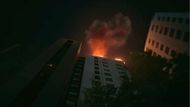
During the tense, action-packed confrontation of Wall to Wall, Woo-sung bombs his apartment with gas. The noise war, mental breakdown, and betrayal have already pushed him over the edge. He locks his enemies, Eun-hwa and Jin-ho, inside the room and causes a huge explosion. It is vicious and abrupt. The building explodes into flames, and all he despised is burned. It is not a silent death — it is massive, startling, and definite.
This scene is frightening because it shows how far one can fall. In this movie, Woo-sung is an ordinary character. However, noise, stress, and loneliness make him someone who destroys everything. It’s both a physical and emotional explosion. You are afraid because it seems viable. Anybody could break under such pressure.
8. Murder twist revealed
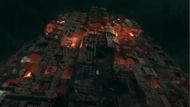
One startling reality emerges as the film reaches its climax. A murder is far more sinister than the commotion and blame tension. Struggle and constant covert espionage were the causes of this awful finding. The chaos between the neighbors has resulted in the death of one person. Power, hate, and terror are there in the scenario, yet it isn’t just loud music or stomping. Tension hits all the more dangerously real with the murder.
This is a terrible turn of events since it exposes the most disagreeable outcome of a daily dispute. In Wall to Wall, what starts as a small grievance turns into a murder. It makes you think twice about those who are higher or lower than you. Could a small amount of rage create something so grotesque? Such an idea stays in the mind after the movie has come to an end.
7. Neighbors turn aggressive
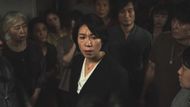
In Wall to Wall, Woo-sung’s noise troubles worsen as neighbors begin to argue with him. They knock on his door, scream in his face, and can even turn violent. Walls that were once thought to be a measure of separation are now used to intimidate people. The apartment corridor becomes a nightmare, with people scowling and abusing Woo-sung. The small gripes turn into an aggressive confrontation.
This event in the film is frightening as people who were pleasant neighbors become dangerous. You get a feel of how fast ordinary citizens can turn violent due to mere irritation. It makes your home’s walls unsafe. It conveys a sense of how fragile civilized behavior can be when overpowered by fear and blame.
6. Surveillance and espionage
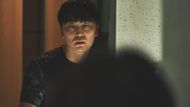
One of the most important scenes in Wall to Wall discloses that Jin-ho has installed secret cameras in the walls and the vent. He records Eun-hwa and Woo-sung without their knowledge. The apartment turns into a surveillance shambles. All the actions are monitored. The sense of seclusion disintegrates. Their lives are actually recorded on the walls.
This scene is disturbing because it suggests that anyone can be your spy. Within Wall to Wall, the camera acts as a weapon. It destroys privacy and confidence. You constantly feel caught and exposed. It’s a pretty awful feeling to be terrified of being spotted in your own house.
5. Identity games: Who's to blame?

In Wall to Wall, Woo-sung and Jin-ho accuse each other of making noise. Reality blurs. Is it a real or imagined sound? Scenes are occasionally seen from the viewpoint of each man. It is impossible to say who is lying. The noise war turns out to be a mental game. They are both incriminating each other.
It is a chilling depiction since it plays with your reality. Wall to Wall shows how honestly one can be suspicious of oneself. The anxiety of not knowing who committed the crime creates panic. The fear of losing control of reality is one of the fears that it plays on.
4. Crypto gamble breaking point

In Wall to Wall, Woo-sung invests his money in cryptocurrencies, hoping that it will provide him with a solution. The market collapses, though. He is deprived of everything. His vision of a good life goes away in one night. In his dark apartment, he sits alone, gazing at the awestruck screen. He has lost both his money and his hope. The upstairs noise continues, but he is already inside.
This scene is terrifying since it demonstrates how a life can be ruined. All virtual bets go awry, and Woo-sung gets ruined. His fainting is convincing. The internet offers money or future security to many people. When something fails, it’s as if the entire planet crumbles. In this scene, the horror of losing everything is demonstrated in silence.
3. Claustrophobic confession scenes
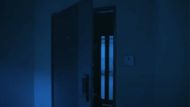
Certain moments in Wall to Wall occur in cramped corridors and dark rooms. The walls are squeezing, and people like Woo-sung speak quietly. It has no breathing. Every word, every glance is leaden. Such spaces cause pressure. The mounting of the tension is not only through words, but also through the absence of space to run away.
These scenes are frightening as you feel like you have been trapped. Wall to Wall‘s angles correspond to Woo-sung’s mental pressure. The closeness of the walls does not allow clear thinking. You want air, space, and liberty, but none of these exist. It serves as a reminder that we do not need to be terrified of monsters. In some cases, it is feasible to do so in exceedingly small places.
2. Accusatory notes on the door
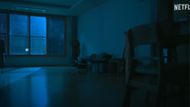
Viewers saw that Woo-sung’s front door had notes pinned on it. In the movie, he is referred to as the gregarious one. They are cross and vituperative. However, he does not think it is he who makes the noise. He kills them, but more emerge. These notes cause him to feel that he is observed, judged, and despised by people he does not even get to see.
It is a frightening moment of the film as it depicts the process of increasing fear through silence. The notes are not aggressive. However, they are painful. They turn Woo-sung’s house into a disgrace. You start being afraid of your neighbors, those strange individuals behind the next door.
1. Mysterious thumping in the night
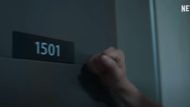
The film begins with a sound. Later in the movie, Woo-sung perceives a series of thumps. This phenomenon is neither loud nor disruptive. However, it is characterized by its repetitive nature. He tries to sleep despite the noise. Others seem indifferent. He starts to become insomniac and obsessive. The noise is naive yet slowly destroys his calm.
This is frightening because fear develops gradually. Wall to Wall shows how small things, even a muffled thump, can grow enormous in your mind. You become aware of it when it’s not there. The noise becomes part of you. And that was the horror—the terrible thing when you knew it might never end, the terrible uncertainty of when it might stop.
Wall to Wall isn’t just a thriller — it’s a psychological descent masked by the ordinary. It shows how isolation and pressure can quietly unravel someone. It builds tension through sound, silence, and tight spaces — until everything finally bursts.
At some point, Woo-sung isn’t the only one feeling trapped — the viewer does too. In the end, it’s not darkness that haunts you — it’s the walls themselves.
Love movies? Try our Box Office Game and Movie Grid Game to test your film knowledge and have some fun!
